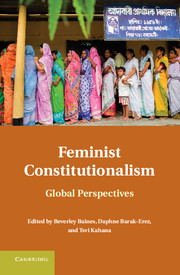Book contents
- Frontmatter
- Contents
- Foreword
- Contributors
- Introduction
- Part I Feminism as a Challenge to Constitutional Theory
- Part II Feminism and Judging
- 4 Her-meneutics
- 5 Intuition and Feminist Constitutionalism
- 6 Women Judges, “Maiden Speeches,” and the High Court of Australia
- 7 Will “Watertight Compartments” Sink Women's Charter Rights? The Need for a New Theoretical Approach to Women's Multiple Rights Claims under the Canadian Charter of Rights and Freedoms
- 8 Constitutional Adjudication and Substantive Gender Equality in Hong Kong
- Part III Feminism, Democracy, and Political Participation
- Part IV The Constitutionalism of Reproductive Rights
- Part V Women's Rights, Multiculturalism, and Diversity
- Part VI Women between Secularism and Religion
- Index
- References
4 - Her-meneutics
Feminism and Interpretation
Published online by Cambridge University Press: 05 June 2012
- Frontmatter
- Contents
- Foreword
- Contributors
- Introduction
- Part I Feminism as a Challenge to Constitutional Theory
- Part II Feminism and Judging
- 4 Her-meneutics
- 5 Intuition and Feminist Constitutionalism
- 6 Women Judges, “Maiden Speeches,” and the High Court of Australia
- 7 Will “Watertight Compartments” Sink Women's Charter Rights? The Need for a New Theoretical Approach to Women's Multiple Rights Claims under the Canadian Charter of Rights and Freedoms
- 8 Constitutional Adjudication and Substantive Gender Equality in Hong Kong
- Part III Feminism, Democracy, and Political Participation
- Part IV The Constitutionalism of Reproductive Rights
- Part V Women's Rights, Multiculturalism, and Diversity
- Part VI Women between Secularism and Religion
- Index
- References
Summary
Does feminism have anything to do with interpretation? The answer is yes. Because stereotypes and discriminatory approaches have left their mark on constitutional and legal traditions, it is only logical to assume that feminism should play a role in counteracting these influences. Feminist interpretation can be a very effective tool in the service of gradual legal change. In fact, the connection between feminism and interpretation can be presented even more ambitiously: feminism should also be understood as offering a new interpretive perspective on human knowledge, including in the legal sphere.
Classical examples of the influence of stereotypes and discrimination on interpretation come from cases in which seemingly neutral documents were interpreted as not applying to women because of cultural biases. One illuminating example comes from the United States in the late nineteenth century, when the Equal Protection Clause in the Constitution was found not to apply to women when they brought equality demands to the Supreme Court – Mira Bradwell was denied access to the Illinois Bar and around the same time women were not recognized as entitled to vote (although the U.S. Constitution used neutral terms in drafting the right to vote, which presumably applied to all “persons”). The real shift in the case law did not emerge until as late as the 1970s.
- Type
- Chapter
- Information
- Feminist ConstitutionalismGlobal Perspectives, pp. 85 - 97Publisher: Cambridge University PressPrint publication year: 2012
References
- 2
- Cited by



